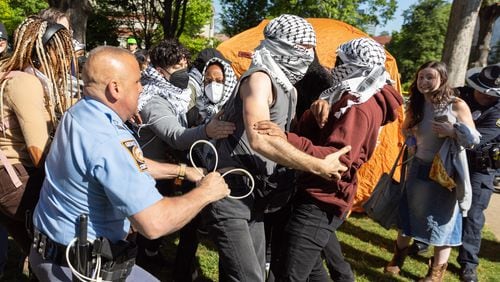Number of uninsured Georgia veterans and spouses by income group
24,700 — The number below 100 percent of the federal poverty level
7,300 — The number between 100 percent and 138 percent* of the federal poverty level
51,700 — The number above 138 percent of the federal poverty level
*138 percent of the federal poverty level represents the cutoff for people who would gain health coverage under an expansion of Medicaid, or about $26,300 for a family of three.
Source: Urban Institute
Poor, uninsured military veterans and their spouses in Georgia won’t gain the same access to critical health coverage that hundreds of thousands of their peers will receive in states that plan to expand Medicaid.
More than 83,000 Georgia veterans and their spouses under age 65 don’t have health insurance, the fourth-largest such population among states nationwide, a recent study examining U.S. Census Bureau data shows. Nearly 40 percent of them — people like Dale Zipperer of Griffin, a Marine from the Vietnam era whose poor health prevents him from working — have incomes low enough to qualify for coverage under a Medicaid expansion set to begin in January under the Affordable Care Act.
Gov. Nathan Deal and Republican governors in some other states have steadfastly opposed the expansion, saying states can't afford to broaden already overburdened Medicaid programs. Supporters say no coverage for large numbers of veterans — a group many Americans wrongly assume automatically receive federal health benefits — means larger premiums and higher hospital bills for Georgians with insurance.
“If these veterans remain uninsured, they are likely to have more unmet needs and more likely to delay medical care,” said Jennifer Haley, a research associate at the nonprofit Urban Institute.
While veterans are less likely to be uninsured than many Americans, 1.3 million under age 65 still lack coverage, an Urban Institute study shows.
Georgia — which the Department of Veteran Affairs said was home to 772,832 veterans in 2010 — is among the states with the largest numbers of uninsured veterans that have also rejected the Medicaid expansion, said Haley, a co-author of the study.
The expansion is a cornerstone of the federal health care law, which calls on states to broaden Medicaid to include people with incomes up to 138 percent of the federal poverty level, about $26,300 for a family of three. Critics of the law say that while low-income Americans need access to health care, it doesn't make sense to expand a program that many states already cannot afford.
Deal and other Republican leaders have proposed turning Medicaid into a "block grant" program, which would limit federal dollars that states get to a lump sum but with fewer conditions on how they can be spent. But the Obama administration has opposed the idea.
Conservatives also question whether the federal government will be able keep its promise to cover the full cost of new enrollees the first three years and no less than 90 percent after that.
In Georgia, health officials estimate the expansion would add 650,000 people to the Medicaid rolls at a cost to taxpayers of $4.5 billion over a decade even with federal help. That’s on top of the hundreds of millions of dollars in shortfalls the program has faced in recent years.
“Governor Deal has said that as long as there is a significant cost to Georgia, we, as a state, cannot afford it,” a Deal spokeswoman said.
Meanwhile, uninsured veterans such as Zipperer are out of luck. Chronic bronchitis and emphysema have left him unable to work. He joined the military at age 17 near the end of the Vietnam War, serving in the Reserve for a year and a half.
Zipperer receives a modest disability pension from the VA but has been unable to qualify for health benefits through that agency, Social Security or Medicaid. A local charity clinic provides him with steroids and other medications.
“Nobody wants to give you a job if you can’t walk halfway down the block without having to sit down because you’re sucking air,” he said.
Like Zipperer, not all veterans qualify for health care through the VA, which has a priority system based on service-related disabilities, income level and other factors. Others don’t live close enough to VA facilities to regularly use them.
“It’s not comprehensive health insurance for every single veteran,” said Tim Sweeney, a health care policy analyst with the Georgia Budget & Policy Institute, a left-leaning think tank. “Even if you are covered, there aren’t VA clinics in every town throughout Georgia.”
Expanding Medicaid would allow veterans who live far away from Georgia’s three VA medical centers in the Atlanta area, Augusta and Dublin and other facilities to go to a local doctor for regular checkups, Sweeney said.
In Georgia, an expansion would mean broadening coverage to include mostly uninsured single adults. The state’s program currently covers 1.7 million people, mostly women who are pregnant, children, the elderly and disabled. The Supreme Court’s ruling on the law last year, however, made the expansion optional for states.
Uninsured veterans and their spouses with income levels 100 percent to 138 percent of the poverty level will still be eligible for federal tax credits through new online insurance marketplaces expected to be running by January. Those below 100 percent of the poverty line — about 25,000 people in Georgia — will not be eligible.
Without an expansion, it will remain extremely difficult for Georgia veterans to qualify for Medicaid, said Linda Lowe, a consumer health advocate.
Unlike in some states that do cover more adults, Georgia veterans who aren’t pregnant, or in a nursing home or don’t have minor children and a very low income aren’t going to qualify, Lowe said.
“Georgia’s (Medicaid) program is pretty skimpy,” she said.
For Zipperer, no expansion means continuing to depend on charity clinics for care.
The veteran said he feels fortunate that he didn’t have to fight in the war but still believes he should receive health benefits for the time he served.
“People automatically think I get all of the VA benefits,” he said. “I wish I did.”





